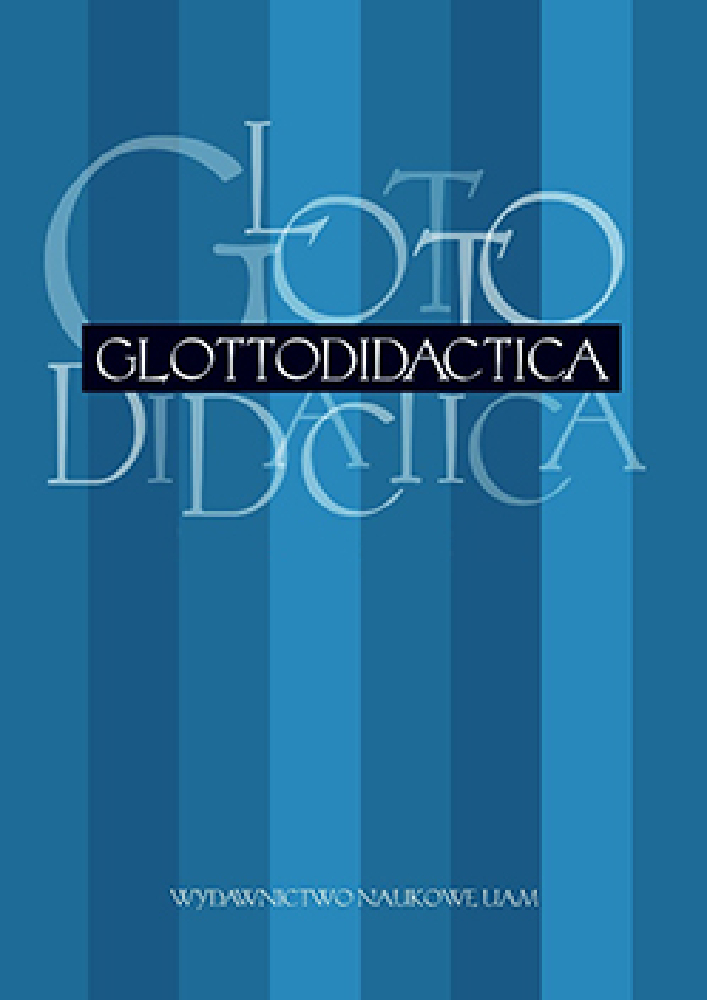Abstrakt
Intercultural education is one of the most important goals of contemporary foreign language teaching. In order to keep pupils strongly motivated to learn foreign languages, they must be made to understand what benefits can be gained from a good command of foreign languages. It is due to international pupil exchanges that young people have the opportunity to come into direct contact with a foreign language, to experience foreign culture in real communicative situations, and in the process verify or overcome deeply rooted stereotypes and prejudices about certain nations. In the article, the author presents quantitative questionnaire results, which allows him to identify the heterostereotypes of Polish and German pupils as well as their attitude towards historical events and current bilateral relations. Additionally, the impact of pupil exchanges on how representatives of both nations see each other and on their further contacts has been discussed. The results obtained can serve not only as guidelines on how to work with stereotypes and prejudices in foreign language classes, but they might also help in effective preparation for the scheduled pupil exchange.
Bibliografia
Adamczak-Krysztofowicz, S. (2005). Kooperatives Miteinander statt Nebeneinander. Zur Bezie- hung zwischen der interkulturellen Fremdsprachendidaktik und den Kulturwissenschaften. Glottodidactica. An International Journal of Applied Linguistics, 30/31, 5-11.
https://doi.org/10.14746/gl.2005.30.01 DOI: https://doi.org/10.14746/gl.2005.30.01
Aras, İ. (2019). Geschlechterklischees in Keleks "Die Fremde Braut". Researcher Social Science Studies, 7 (1), 149-167. https://doi.org/10.18301/rss.803 DOI: https://doi.org/10.18301/rss.803
Bodył, D. / Chmielewska-Molik, K. / Gorąca-Sawczyk, G. (2018). Austausch am eigenen Leib erfahren - die Rolle der Reflexion für angehende Lehrende in interkulturellen Begegnungen. Germanica Wratislaviensia, 143, 457-470. https://doi.org/10.19195/0435-5865.143.30 DOI: https://doi.org/10.19195/0435-5865.143.30
Ciepielewska-Kaczmarek, L. (2016). Möglichkeiten und Grenzen interkulturellen Lernens im institutio- nalisierten DaF-Unterricht. Poznań: Wydział Neofilologii UAM w Poznaniu. https://doi.org/10.14746/9788394601799 DOI: https://doi.org/10.14746/9788394601799
Edelenbos, P. / Kubanek-German, A. (2004). Der Effekt von internationaler Zusammenarbeit. Frühes Deutsch, 1, 20-23.
Gebbert, H. (2007). Ansätze internationaler Schülerbegegnungsprojekte und interkulturelles Lernen. Olden- burg: BIS-Verlag der Carl-von-Ossietzky-Universität. http://oops.uni-oldenburg.de/818/1/gebans07.pdf [Zugriff am: 12.04.2022].
Gorąca-Sawczyk, G. / Jourdy, N. (2017). Schüleraustausch als Weg zur Entwicklung interkultureller Kompetenz. Deutsch-französische und deutsch-polnische Austauschprojekte im schulischen Bereich. Colloquia Germanica Stetinensia, 26, 271-285. https://doi.org/10.18276/cgs.2017.26-16 DOI: https://doi.org/10.18276/cgs.2017.26-16
Mihułka, K. (2010a). Czy podkarpacka młodzież lubi Niemców? Analiza ankiety przeprowadzonej wśród licealistów wybranych podkarpackich szkół. Studia Niemcoznawcze - Studien zur Deutschkunde, XLIV, 67-81.
Mihułka, K. (2010b). Stereotype und Vorurteile in der deutsch-polnischen Wahrnehmung. Eine empirische Studie zur Evaluation des Landesbildes durch Germanistikstudenten. Rzeszów: Wydawnictwo Uniwersytetu Rzeszowskiego.
Mihułka, K. (2011). Zur Notwendigkeit des interkulturellen Lernens in polnischen Schulen. Das Bild der Deutschen in den Augen polnischer Gymnasiastinnen und Gymnasiasten ausgewählter Schulen in der Woiwodschaft Karpatenvorland. In: S. Adamczak-Krysztofowicz / M. Kowa- lonek-Janczarek / M. Maciejewski / A. Sopata (Hrsg.), Aktuelle Probleme der angewandten Linguistik. Interkulturalität als Schlüsselkompetenz für Fremdsprachenlehrer, Übersetzer und Mediatoren (S. 205-215). Poznań: Wydawnictwo Naukowe UAM.
Mihułka, K. (2014). "Nie lubię Niemców, bo nie" - o autorefleksji w postrzeganiu innych. Neofilolog, 42 (1), 63-76. DOI: https://doi.org/10.14746/n.2014.42.1.6
Pawłowska, A. (2014). (Un-)typisch deutsch? (Un-)typisch polnisch? - Polnische Germanistik- studierende über sich selbst und ihren deutschen Nachbarn. Studia Germanica Gedanensia, 31, 266-277.
Pawłowska-Balcerska, A. (2019). Stereotypen geht es gut. Ein Beitrag zu stereotypischem Denken polnischer und deutscher Studierender am Beispiel eines E-Mail-Tandemprojekts. Glottodidactica. An International Journal of Applied Linguistics, 46 (2), 143-159. https://doi.org/10.14746/gl.2019.46.2.09 DOI: https://doi.org/10.14746/gl.2019.46.2.09
Rösch, O. (1998). Mit Stereotypen leben? Wie Russen und Deutsche sich heute sehen. In: O. Rösch (Hrsg.), Interkulturelle Kommunikation in den Geschäftsbeziehungen zwischen Russen und Deutschen. Beiträge aus Wissenschaft und Praxis zum zweiten Wildauer Workshop "Interkulturelle Kommunika- tion". Wildauer Schriftenreihe (S. 51-62). Band 1. Berlin: News & Media.
Ruchniewicz, K. (2008). Stehlen die Polen immer noch die deutschen Autos? Zur Aktualität der polnisch-deutschen Stereotype. Polen-Analysen, 40, 2-8. / [Zugriff am: 22.08.2022]. https://doi.org/10.31205/PA.040.01 DOI: https://doi.org/10.31205/PA.040.01
Schüleraustausch-ABC. https://www.schueleraustausch-abc.de/20100520/top-10-gruende-fuer-einen-schueleraustausch/ [Zugriff am: 20.04.2022].
Skowronek, B. (2008). Gesellschaftlicher Aspekt des Fremdsprachenunterrichts. Scripta Neophilo- logica Posnaniensia, 9, 205-213.
Storch, G. (2001). Deutsch als Fremdsprache - Eine Didaktik. Theoretische Grundlagen und praktische Unterrichtsgestaltung. München: Wilhelm Fink.
Thomas, A. (2006). Die Bedeutung von Vorurteil und Stereotyp im interkulturellen Handeln. Interculture Journal: Online-Zeitschrift für interkulturelle Studien, 5 (2), 3-20. https://nbn-resolving. org/urn:nbn:de:0168-ssoar-454086 [Zugriff am: 28.08.2022].
Licencja
Prawa autorskie (c) 2022 Mariusz Jakosz

Utwór dostępny jest na licencji Creative Commons Uznanie autorstwa – Bez utworów zależnych 4.0 Międzynarodowe.
Autorzy
Autorzy tekstów przyjętych do publikacji w czasopiśmie Glottodidactica są zobowiązani do wypełnienia, podpisania i odesłania na adres redakcji umowy o udzielenie nieodpłatnej licencji do utworów, z zobowiązaniem do udzielania sublicencji CC.
Zgodnie z umową, autorzy tekstów opublikowanych w czasopiśmie Glottodidactica udzielają Uniwersytetowi im. Adama Mickiewicza w Poznaniu niewyłącznej i nieodpłatnej licencji oraz zezwalą na użycie sublicencji Creative Commons Attribution-NoDerivatives 4.0 International (CC BY-ND 4.0).
Autorzy zachowują prawa do dalszego, swobodnego rozporządzania utworem.
Użytkownicy
Zainteresowani użytkownicy internetu uprawnieni są do korzystania z utworów opublikowanych od 2015 roku w Glottodidactica pod następującymi warunkami:
- uznanie autorstwa - obowiązek podania wraz z rozpowszechnionym utworem, informacji, o autorstwie, tytule, źródle (odnośniki do oryginalnego utworu, DOI) oraz samej licencji;
- bez tworzenia utworów zależnych - utwór musi być zachowany w oryginalnej postaci, nie można bez zgody twórcy rozpowszechniać np. tłumaczeń, opracowań.
Do wszystkich tekstów opublikowanych przed 2015 r. prawa autorskie są zastrzeżone.
Inne
Uniwersytet im. Adama Mickiewicza w Poznaniu zachowuje prawo do czasopisma jako całości (układ, forma graficzna, tytuł, projekt okładki, logo itp.).





